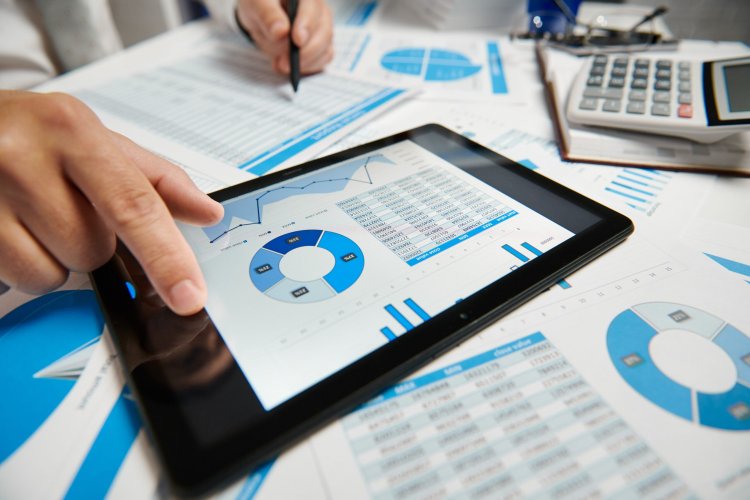How to manage your accounts as a small business
By Henry Williams on Small Business UK - Advice and Ideas for UK Small Businesses and SMEs Everything you need to know about preparing your financials in the early stages of business The post How to manage your accounts as a small business appeared first on Small Business UK.

By Henry Williams on Small Business UK - Advice and Ideas for UK Small Businesses and SMEs

Setting up a business is an exciting new chapter in life, and it can be tempting to put all your energy into the aspects of entrepreneurship that give you the most joy and reward.
But it’s important not to do so at the expense of the less interesting but equally vital aspects of running a business, such as managing accounts…
Yes, the first thing you should start putting things into place is the financials. If your business’s numbers aren’t managed properly, you can create serious problems for yourself when it comes to managing taxes and cashflow.
On the flip side, getting it right from the start sets the tone for any business, resulting in higher earnings and greater success in the long run.You don’t need to be a maths wiz to successfully prepare and manage your accounts as a small business, all you need is a basic understanding of bookkeeping and finance.
Bookkeeping
It takes time to get this right but if done correctly your business will be in a great position.
See also: Best UK small business accounting software – review
There is always a choice, so bookkeeping can be done manually or using cloud accounting software.
Various tasks like dealing with invoices, recording expenses, monitoring outgoings and paying employees can be very time consuming.
If you haven’t got the time to do it all yourself, you can hire someone to do it for you.
3 top picks of accounting software for small businesses
If you are going to use software, it’s worth shopping around to find the perfect package for your business. There are a number of key providers in the space and they all offer slightly different features and pricing.
Annual accounts
The yearly financial performance of your business must be presented in a formal record and in a prescribed format – this includes sales, costs, assets (things like stock or machinery or equipment) and amounts owed.
The due date for submitting accounts depends on whether you operate as a sole trader or a limited company.
You can choose when your accounting year is to end, but since taxable income for sole traders is calculated on a 6 April to 5 April basis – and accounts are needed to back up the tax return – it makes sense for sole traders (and partnerships) to have an accounting year that runs from 1 April to 31 March.
The relevant accounts need to be completed before the following 31 January, to be used when completing your self-assessment tax return due on that date.
For limited companies you can more or less choose your accounting year to suit yourself and your business but you still need to complete and file accounts every year with Companies House.
Corporation tax
All UK limited companies pay this, and the main rate is currently charged at 19 per cent on any profit generated that isn’t ring-fenced. A corporation tax return must be completed, with tax due for payment to HMRC within nine months and one day of the accounting period.
Self-assessment income tax
To calculate your personal income tax on all your income for the year (6 April to 5 April) you must unfortunately fill out another form.
This form must be completed, filed and any tax paid no later than the 31 January following the previous 5 April tax-year.
Income tax rates
A tax-free personal allowance of £12,570 (2022-23) is available to everyone, and approximately the next £37,699 of “basic rate” income above this personal allowance is taxed at 20 per cent.
Any income above this falls into the “higher rate” (£50,271 to £150,000) band, and is currently taxed at 40 per cent, which then goes up to 45 per cent for earnings above £150,000.
Anyone earning over £100,000 also starts to lose their personal allowance: effectively, if you earn between £100,000 and £125,000, you will be taxed at 60 per cent (tax at 40 per cent on income over £100,000 up to £125,000 plus tax at 40 per cent on the loss of personal allowance up to £12,500). And if you earn over £125,000 the personal allowance goes completely.
Additionally, out of employment (salary and wages) income comes national insurance, which is payable at various rates and thresholds.
In the case of a limited company, dividend income is taxed at lower rates but there is no national insurance to be paid.
- The tax-free dividend allowance is £2,000
- Basic-rate taxpayers pay 8.75 per cent on dividends
- Higher-rate taxpayers pay 33.75 per cent on dividends
- Additional-rate taxpayers pay 39.35 per cent on dividends.
VAT
Irrespective of your business structure, you must register for VAT if your annual turnover (sales) is £85,000 or more – registration is optional if turnover is below that.
You will charge your customers at the standard 20 per cent rate of VAT, which means that you must add 20 per cent to your sales invoice values and then keep this amount aside from what your customers pay you.
You will then be able to reclaim any VAT you have paid on business-related purchases and expenses and you must pay the net amount of the two over to HMRC. VAT returns and payments are due on a quarterly basis.
Making Tax Digital
Making Tax Digital (MTD) for VAT is new HMRC legislation that forms part of a wider plan to eventually digitise all tax for UK businesses. The legislation is being introduced in multiple stages over the next few years.
As of April 2022, all VAT-registered businesses, regardless of income, have been required by law to keep digital records and file digital VAT returns through MTD-compatible software.
MTD for Income Tax and Self-Assessment will be introduced in April 2024, and will require all businesses, landlords, sole traders, and partnerships with income over £10,000 to keep digital records, provide quarterly updates, and complete their income tax and self-assessment returns through MTD-compatible software.
The final stage of MTD, set to be introduced in 2026, is MTD for Corporation Tax. Nothing has yet been announced about how Corporation Tax will be affected by MTD.
>See also: HMRC’s new digital VAT rules – 6 steps for submitting tax returns correctly
PAYE
Income tax and national insurance need to be calculated, deducted from the gross wages and salaries of your staff and paid over to HMRC on their behalf.
This is a monthly payment that’s deducted from your employee’s gross salaries, meaning that there’s no cost to your business.
National insurance is deducted at a rate of 13.25 per cent for employees, although both income tax and NI only kick in once a certain earnings limit is reached.
Employee National Insurance contributions
| 2022/23 | 2022/23 | |
|---|---|---|
| Weekly earnings threshold | Annual equivalent | |
| Secondary Threshold – earnings below this limit incur no NICs | £175 | £9,100 |
| Primary Threshold | £242 | £12,570 |
| Upper Earnings Limit – earnings above the Primary Threshold and below the Upper Earnings Limit will be taxed at 12%. | £967 | £50,270 |
| Any earnings above the Upper Earnings Limit are taxed at 2% |
Employer’s national insurance is charged at a rate of 13.8 per cent on the gross salary, again within certain thresholds – this is not deducted from their salaries and so it represents a real, additional tax cost to your business.
Different rates of national insurance contributions apply for self-employed sole traders:
Self-employed National Insurance contributions 2022-23
| Annual profits threshold | Class 2 NICs rate | Class 4 NICs rate | |
|---|---|---|---|
| Small profits threshold – Earnings below this threshold incur no NICs | £6,725 | £3.15 | 0% |
| Lower Profits Limit | £11,909 | £3.15 | 10.25% |
| Upper Profits Limit | £50,270 | £3.15 | 3.25% |
IR35 tax changes
In April 2021, HMRC brought thousands of freelance contractors who were effectively full-time employees within PAYE, in an effort to tackle what the taxman saw as “disguised employment”. These IR35 tax changes mean that responsibility for assessing the tax status of self-employed contractors has shifted from the contractor to the company that hires them.
>See also: How to wind up your personal service company ahead of IR35 legislation
What next?
With all the information above, it is probably apparent by now what course of action suits you best when it comes to bookkeeping and basic accounting – you have the choice to either manage it yourself or just outsource it to an expert.
‘As the profits grow, it’s smart to have absolute control and visibility of your business, making sure that it’s set up in a tax-efficient way and you can make sound management decisions based on accurate, timely figures’
No matter what you choose to do, you should aim to decide ASAP and stick to your decision. What you should avoid is spending hours trying to get it done on your own and then giving up and handing it over to someone that can do it better.
Unfortunately, starting a business comes with time-consuming and distracting, yet unavoidable admin in the form of bookkeeping, tax and accounting. This can be frustrating.
However, these things are crucial, both in terms of keeping you safe and compliant in the eyes of the tax man and in providing valuable information on which to run your business.
Over time, the money that coming in will increase. As the profits grow, it’s smart to have absolute control and visibility of your business, making sure that it’s set up in a tax-efficient way and you can make sound management decisions based on accurate, timely figures.
Further Resources
Here are some key documents and articles to explore if you need to learn more about managing your accounts as a small business:
The ultimate guide to payroll compliance – A download for any company taking those first steps to implement a payroll software system. From taking on new employees to dealing with PAYE (pay as you earn) and understanding RTI (Real Time Information), this guide will put you in a position where you’re ready to manage your payroll with confidence.
Best UK small business accounting software – Signing up for an online accountancy software package is inevitable as the government rolls out Making Tax Digital. This article compares the most popular small business accounting software packages on the market.
Accounting in foreign currencies – What small business owners need to know.
Hiring an accountant: A small business guide – Advice from Ben Herbert, director of d&t chartered accountants.
Cloud and SaaS accounting – Five advantages of using a cloud-based and SaaS (software-as-a-service) accounting system for your business.
Everything you need to know about small business accounting – This eBook will show you how to avoid common accounting pitfalls, explain accounting processes and provide expert accounting tips.
National Insurance Contributions explained – The IFS (Institute for Fiscal Studies) TaxLAB gives a thorough breakdown on NICs and all related taxes.
The post How to manage your accounts as a small business appeared first on Small Business UK.






















